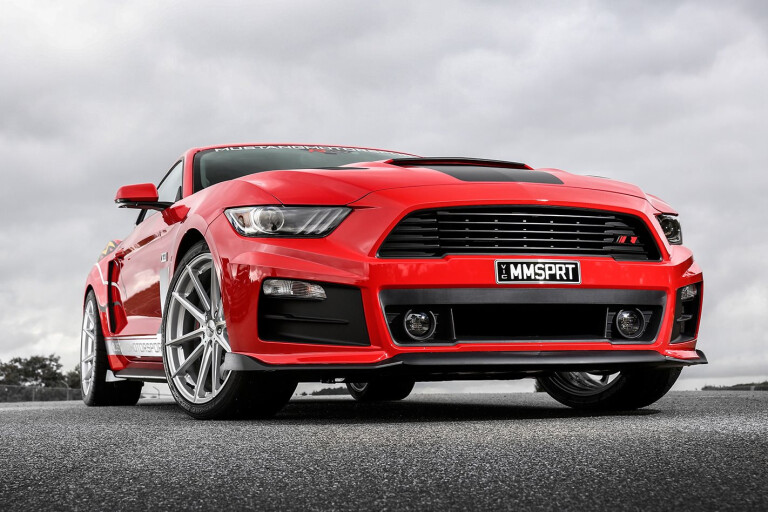
Everybody was on the edge of their seats waiting for the all-new Mustang to hit Aussie showrooms, and even now it's here, demand is such that you’ll need to wait your turn to get your mitts on a new Pony.
But head honcho of Melbourne-based Mustang Motorsport, Craig Dean, wasn’t that patient. So his solution was to import his own Mustang and convert it to right-hand drive himself. Patience may well be a virtue, but sometimes you’ve just gotta act.
Obviously, this is doing it the hard way, so why didn’t he just wait until local examples arrived, grab one of those and save himself a whole mess of toil moving the tiller across the cabin?
Well, it pays to remember that Dean has lots of experience converting cars from left- to right-hook, and his Crossover Car Conversions company has the skills to prototype stuff like the new firewall required for the switch. But there’s more to it than that.
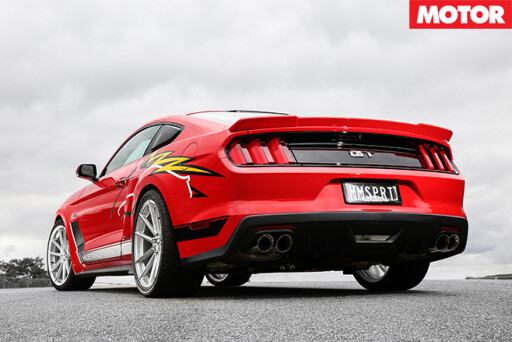 “We wanted to be first,” he explains. “And our customers want to be first with the latest.” To prove the point, one of Dean's customers snapped up the sister car to this one, figuring the extra cash was worth it to be cruising around in a new Mustang instead of ringing the Ford dealer and asking “when?” every few days.
“We wanted to be first,” he explains. “And our customers want to be first with the latest.” To prove the point, one of Dean's customers snapped up the sister car to this one, figuring the extra cash was worth it to be cruising around in a new Mustang instead of ringing the Ford dealer and asking “when?” every few days.
It’s also true that having a Mustang on the road now enables Mustang Motorsport to showcase its range of special bits, some of which have been developed locally, others coming from the hallowed house of Roush Industries in the US.
That ability to showcase what’s possible with a new Pony car is even more important when you consider that Ford Australia has no plans to import the tastier, high-end, hi-po variants of the ’Stang. This means, of course, that if you want a nag with more drag, you need to be talking to people like Mustang Motorsport, or Rob Herrod.
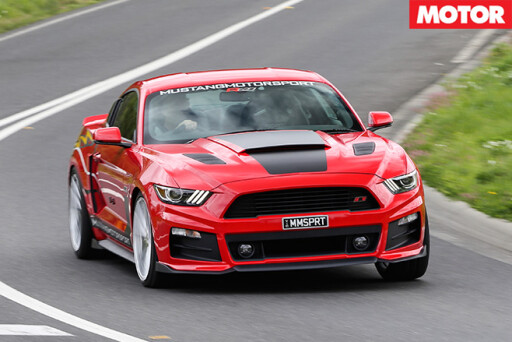 So, how is this car different from the stuff you’ll be able to get over the counter at a Ford dealership? It starts with details like the central gauge cluster, the vented GT bonnet, Recaro chairs and the fact that the line-locker that our nanny-state authorities have ruled out for Australia is still functioning (along with launch control).
So, how is this car different from the stuff you’ll be able to get over the counter at a Ford dealership? It starts with details like the central gauge cluster, the vented GT bonnet, Recaro chairs and the fact that the line-locker that our nanny-state authorities have ruled out for Australia is still functioning (along with launch control).
Locally developed gear includes the coil-over suspension, two-piece front rotors (the calipers are already Brembo units) and a stiffening kit for the rear suspension cradle to dial axle-tramp out of the independent-rear-suspension equation.
The Roush gear, meanwhile, starts with the body kit that leads off with a new grille, front bumper and splitter. Then there’s the bonnet scoop, guard flutes, winglets on the side-skirts, rear spoiler, upper and lower quarter-panel scoops and the rear valance.
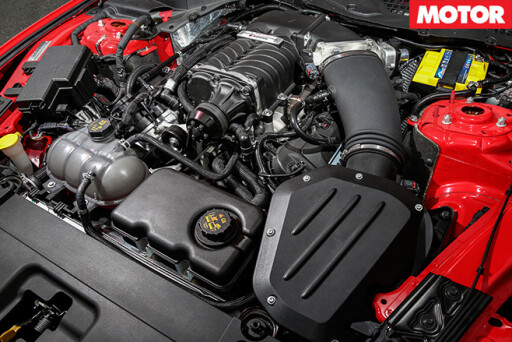 The headline act from Roush is the supercharger, a twin-screw unit with 2.3 litres of displacement, a water-to-air intercooler, cold-air intake and an axle-back exhaust with a bi-modal valve and four tips (which forced the new valance).
The headline act from Roush is the supercharger, a twin-screw unit with 2.3 litres of displacement, a water-to-air intercooler, cold-air intake and an axle-back exhaust with a bi-modal valve and four tips (which forced the new valance).
On the dyno, the combo grunts out 468kW at the crank (hence the R627 tag) and, combined with the Performance Pack GT Mustang’s 3.73:1 Torsen LSD, Getrag six-speed manual and a set of just-released 20-inch TSW ‘Bathurst’ alloys (9.0-inch at the front; 10.0-inch out back) you’ve got yourself a pretty serious piece of hardware. Looks tough, too.
My first attempt to slide into the driver’s seat is made a bit more complicated than it should have been thanks to the too-low steering column, a generic Ford thing given my experience with FG Falcons.
Turns out that, no, it was set up that way to make the set-up perfect for when this car’s showroom duties are done and the race-seat goes in (Dean is a keen competitor on the tarmac rally scene, and this car will eventually be turned to that task).
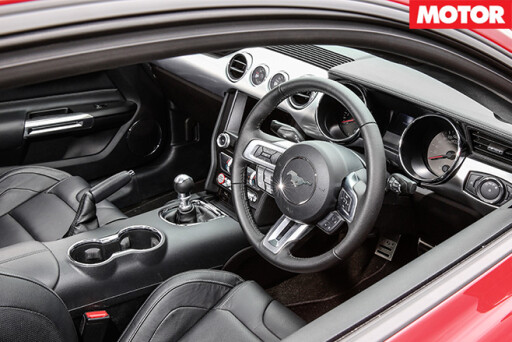 Yes, the column is adjustable, but even at the top of its travel, it’s too close to my knees. Ah well. Things improve when I give the starter-button a jab and the blown 5.0-litre blatts into life. This thing is loud, although closing the bi-model flap would shut it up. But I’m not here for that, am I?
Yes, the column is adjustable, but even at the top of its travel, it’s too close to my knees. Ah well. Things improve when I give the starter-button a jab and the blown 5.0-litre blatts into life. This thing is loud, although closing the bi-model flap would shut it up. But I’m not here for that, am I?
The shifter isn’t quite rifle-bolt sharp, but it’s not far off it. So can somebody please tell me, then, how a mob can make a shifter so good and then fit it with a reverse lock-out collar that rattles on every shift? Americanos, eh?
The clutch itself, though, is extremely light, yet has a positive feel, and it lets you in on precisely where the friction point lives. This is not an engine you’re going to be stalling first up, either – it feels like it has plenty of flywheel and it’s smooth to boot.
The ratios in the six-speed manual seem to be relatively short for the first five gears, with a big jump to the super-overdriven sixth (100 kliks in top equals about 1700rpm). Thanks to those closely stacked first five, fifth gear is viable even in 70km/h traffic and its feel encourages you to shift up early.
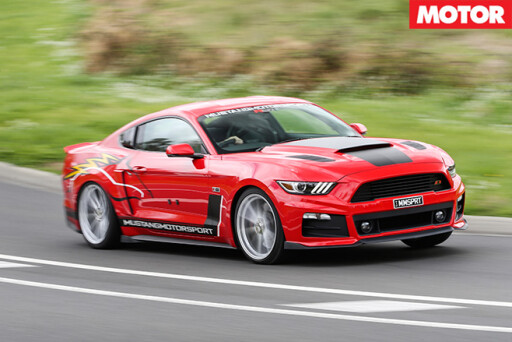 Get the thing spinning above about 2000rpm, however, and you can feel the meat of that 10 or 11 pounds of boost wading in to the fight. Go further ’round the tacho face and the Coyote just gets more and more serious.
Get the thing spinning above about 2000rpm, however, and you can feel the meat of that 10 or 11 pounds of boost wading in to the fight. Go further ’round the tacho face and the Coyote just gets more and more serious.
By the time you’re getting anywhere near redline, the thing is going off its nut. Not in a bad way, mind, and there’s never any blower-belt whine or other hysterics from under the lid.
There is, however, a monumental racket from those four exhaust tips. And the DOHC, blown-and-injected wonder has that neat trick of feeling and sounding like all the good bits of an old-school V8.
It has the full-fat mid-range, for instance, and, I swear, the noise totally reminds me of an old 351 Cleveland at full chat, including the bass notes and that distinctive thong-clap racket when you’re poking it with the really sharp stick. But while it does well torque-wise as you get to around 3500rpm, the engine is also remarkably linear and progressive.
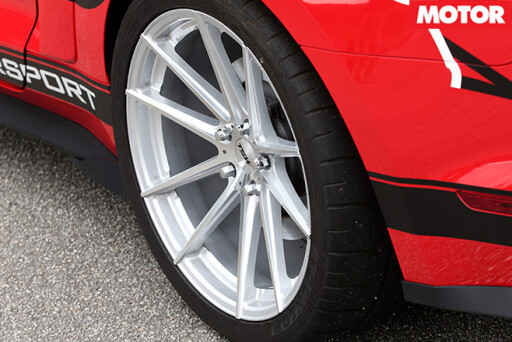 What you put in with the right foot is always met with the output at the back wheels you’re expecting. Of course, even with 295mm rear Dunlop Sport Maxxes, there are always sufficient newton-metres heading through the driveshafts to unhook them.
What you put in with the right foot is always met with the output at the back wheels you’re expecting. Of course, even with 295mm rear Dunlop Sport Maxxes, there are always sufficient newton-metres heading through the driveshafts to unhook them.
In fact, you can forget about getting cute in first gear, because it’ll just end in a smoke-fest. Even rolling off in second and jumping on the noise will see the hoops melting before 4000rpm has been logged.
Happily, though, the braced rear cradle seems to do the job it was designed for and the wheelspin is easily managed and doesn’t send the whole car into a juddering spasm of axle tramp. If – and it’s a big if – you could hook it all up, you’d be looking at a lazy low-12-second car here.
But you’d want a can of VHT with you on the day. Dean reckons the independent rear suspension leaves space under the car for a set of 305mm rears, and, after the supercharger box, that’d be the first one I’d be ticking.
This isn’t a one-trick pony, and the sticky tyres and taut chassis play along. The coil-overs were set for our test drive at about the mid-way point for stiffness, and it’s quite remarkable how well the thing rides. There’s a hint of dullness through the helm in the manner of most modern power-steering systems, but the car is relatively pointy without feeling flighty.
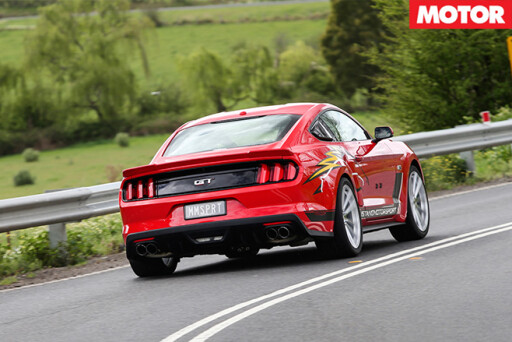 There’s a toggle-switch that changes the weighting of the steering, but setting it to Sport just seems to add weight, not feel. This made some corners a graceless series of stabs, as the tiller suddenly didn’t want to be moved from where it was pointing at that moment. The Mustang could be a bit nose-heavy, too, but you’re going to need to take it to a racetrack to really explore that territory.
There’s a toggle-switch that changes the weighting of the steering, but setting it to Sport just seems to add weight, not feel. This made some corners a graceless series of stabs, as the tiller suddenly didn’t want to be moved from where it was pointing at that moment. The Mustang could be a bit nose-heavy, too, but you’re going to need to take it to a racetrack to really explore that territory.
Dynamically, the biggest complaint is driveline shunt. It’s not as bad as some I’ve driven, but I can’t recall a single full-sized, rear-drive Ford product I’ve ever driven with a manual ’box that didn’t snatch and root at low speed, in a low gear, on light throttle. Again, I’ve driven a lot worse than this one, but it still surprises me that it should be so in 2015.
The quality of the left-to-right conversion is flawless from what I could see, but it does lead to some elements that, to be fair, have to be called characteristics rather than flaws. For instance, the original driver’s footrest remains in the passenger’s footwell (no point removing it and leaving a big hole in the carpet, Dean says) and the bonnet release is still on the left.
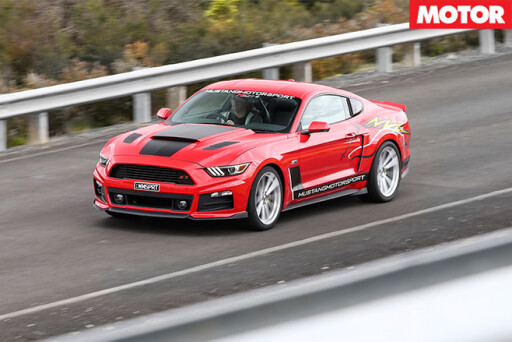 That this is not a factory supercharged car is also evident from the gauge in the dash which measures manifold vacuum and, predictably, goes utterly off the scale when you start making boost.
That this is not a factory supercharged car is also evident from the gauge in the dash which measures manifold vacuum and, predictably, goes utterly off the scale when you start making boost.
Other oddities include the bonnet scoop which is non-functional and the plastic covers over the rear three-quarter windows that turn an already big blind-spot into a monster that makes lane-changing a captain’s call in the truest political sense of the term.
If this was my Mustang, Jack Roush would be keeping those covers. Anyway, none of that stuff would be a deal-breaker for most people, and at the core of this thing is a very fast, very capable car that suggests the whole Mustang thing will gain legs in this country.
So you want to get your hands on a Mustang-Motorsport enhanced, Roush-blown Mustang, how do you get one? Actually, you don’t. There’s simply no point in converting a left-hooker when you can start with an Australian-delivered car with the steering wheel already in the right spot.
Besides which, this car would cost something like $175,000 to replicate, and that just won’t add up for would-be Mustang buyers. So, this car is one of only two that will ever be made this way. If you want a hi-po Mustang Mr. Dean and his merry men can now accommodate you as long as you're cool with a Shelby badge, rather than a Roush one.
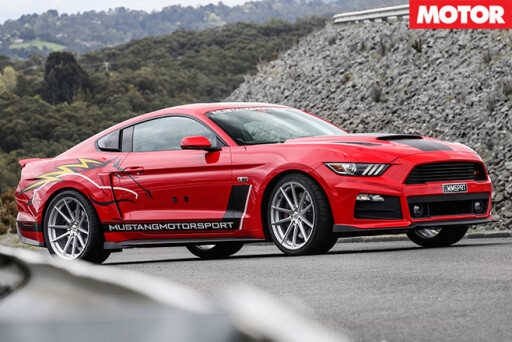 The point is, all the bits and pieces that make this one so impressive will work with your locally delivered ’Stang. And the good news is you can cherry-pick the parts you want and pass on the ones you don’t.
The point is, all the bits and pieces that make this one so impressive will work with your locally delivered ’Stang. And the good news is you can cherry-pick the parts you want and pass on the ones you don’t.
4 out of 5 stars
Specs
Body: 2-door, 4-seat coupe
Drive: rear -wheel
Engine: 4951cc V8, DOHC, 32v, supercharger
Bore/stroke: 92.2 x 92.7mm
Compression: 11.0:1
Power: 468kW @ 6800rpm
Torque: 729Nm @ 4500rpm
Power/weight: 278kW/tonne
Transmission: 6-speed manual
Weight: 1681kg (stock GT)
Suspension(f): A-arms, coil-overs, anti-roll bar
Suspension(r): multi-links, coil-overs, anti-roll bar
L/W/H: 4784/1916/1381mm
Wheelbase: 2720mm
Tracks: 1570/1637mm (f/r)
Steering: Electrically-assisted rack-and-pinion
Brakes(F): 380mm ventilated discs, 4-piston calipers
Brakes(R): 330mm ventilated discs, single-piston calipers
Wheels: 20.0 x 9.0-inch (f); 20 x 10.0-inch (r)
Tyre sizes: 265/35 ZR20 (99Y) (f); 295/30 ZR20 (r)
Tyre: Dunlop Sport Maxx Race
Price as tested: $175,000 (est)
Roush? Who's he?
The man behind the legend
BORN in 1942, Jack Roush heads up Roush Industries, which now employs 3000 people, mainly in the engineering and prototyping side of the transport industry.
But the Roush brand is best known for its motorsport activities and the rap sheet is a corker. It covers stock-car (NASCAR), sportscar and drag racing, and includes 32 championships and more than 400 wins over more than four decades.
Roush moved to Detroit in 1964 to work for Ford and was immediately drawn to the motorsport world, joining a group of like-minded individuals called The Fastbacks in about 1966. By 1970, Roush was running successful drag-racing teams and, in 1976, he formed Jack Roush Performance Engineering.
In the 1980s, it was sportscar racing and then NASCAR at the end of the decade. Roush has also supplied engines and pretty much everything else to other super-successful race teams around the world.
These days, the focus is on designing and making fully integrated performance gear using the knowledge gained from nearly 50 years on race tracks. Stuff like the blower on this car, for instance.

COMMENTS